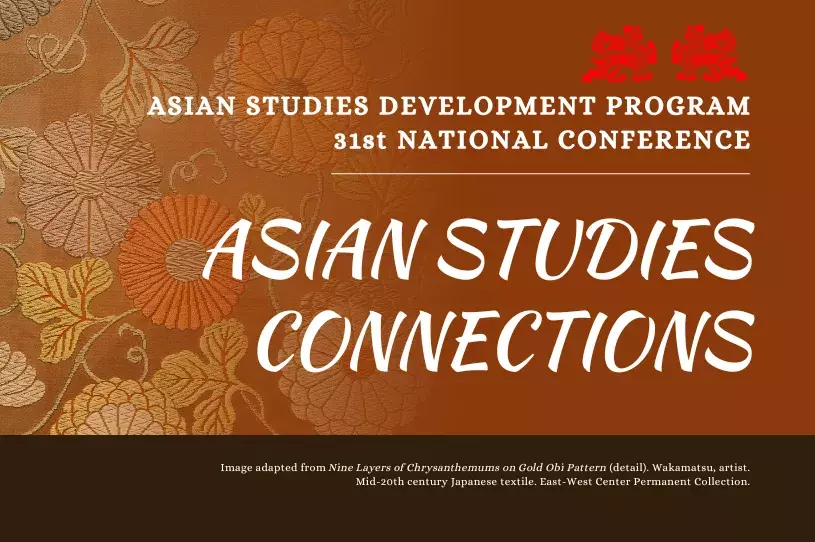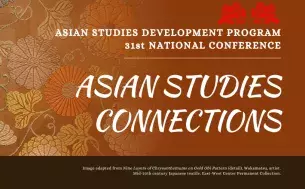Error message

ASDP 31st National Conference
Asian Studies Connections
March 7-9, 2024
Omni Parker House Hotel in Boston, Massachusetts
Conference Theme
Asian Studies Connections
Asia is plural, and how Asia matters depends on angles of connection. Asian studies connect diverse inter- and cross- disciplinary approaches and perspectives, but also encourage tightly focused engagements with contemporary issues and identities. The 2024 ASDP National Conference invites papers that explore how connections (and disconnections) with and within Asia have mattered and continue mattering, culturally, economically, ecologically, scientifically, and politically. In addition to sharing multidisciplinary research, the Conference will provide a forum for exploring both pedagogical and institutional innovation and insights.
Conference Registration
All presenters and attendees must register for the program. Registration covers an opening reception, two lunches, and breaktime refreshments. Deadline to register is Monday, March 4, 2024 3:00pm Hawaii Time. Any on-site registrations after this deadline will not include meals.
Registration Fees:
- Registration: US$325 (through December 15, 2023)
- Late Registration: US$375 (after December 15, 2023)
- Student registration: US$275 (ID required at time of check in)
Field Trips - Thursday, March 7
- Museum of Fine Arts, Boston (MFA) - Note: Van transportation between hotel and museum is sold out.
- Location: 465 Huntington Avenue, Boston, MA 02115
- Schedule:
- Depart hotel 12:00pm and arrive at MFA 12:30pm
- Tour - 12:45pm
- Depart MFA at 3:00pm for hotel
- Includes:
- transportation to and from museum (14 people - Sold Out)
- guided tour
- self-guided museum exploration
- Peabody Essex Museum (PEM)
- Location: 161 Essex Street, Salem, MA 01970
- Schedule:
- Depart hotel 9:00am and arrive at PEM 10:00am
- Depart PEM at 3:00pm for hotel
- Includes:
- transportation to and from museum (14 people)
- guided tour
- self-guided museum exploration
Conference Location & Hotel Accommodations
Make your reservation by the February 5, 2024 deadline to secure the conference rate.
The conference will be held in Boston, Massachusetts at the Omni Parker House Hotel. The group room rate is $169 + tax per night for single & double occupancy and $199 + tax per night for triple occupancy.
Hotel & City:
Omni Parker House
60 School Street
Boston, MA 02108
The city of Boston is steeped in history, and the Omni Parker House is ideally situated in the city’s historic center, directly across from Old City Hall. Many of Boston’s most beloved sites and attractions are within walking distance and easy access so your guests may experience the best of Boston during their stay at the Omni Parker House.
Learn more about Boston: Visiting Boston Guide Website
Keynote Speakers
Dr. Ya-Wen Lei
Presentation Title: The Gilded Cage: Technology, Development, and State Capitalism in China
Since the mid-2000s, the Chinese state has increasingly shifted away from labor-intensive, export-oriented manufacturing to a process of socioeconomic development centered on science and technology. Ya-Wen Lei traces the contours of this techno-developmental regime and its resulting form of techno-state capitalism, telling the stories of those whose lives have been transformed—for better and worse—by China’s rapid rise to economic and technological dominance.
Drawing on fieldwork and a wealth of in-depth interviews with managers, business owners, workers, software engineers, and local government officials, Lei describes the vastly unequal values assigned to economic sectors deemed “high-end” versus “low-end,” and the massive expansion of technical and legal instruments used to measure and control workers and capital. She shows how China’s rise has been uniquely shaped by its time-compressed development, the complex relationship between the nation’s authoritarian state and its increasingly powerful but unruly tech companies, and an ideology that fuses nationalism with high modernism, technological fetishism, and meritocracy.
Some have compared China’s extraordinary transformation to America’s Gilded Age. Lei reveals how it is more like a gilded cage, one in which the Chinese state and tech capital are producing rising inequality and new forms of social exclusion.
Ya-Wen Lei is a Professor in the Department of Sociology at Harvard University. She is also affiliated with the Ya-Wen Lei is Professor in the Department of Sociology at Harvard University. She is also affiliated with the Fairbank Center for Chinese Studies. She is the author of The Contentious Public Sphere: Law, Media, and Authoritarian Rule in China (Princeton University Press, 2018) and The Gilded Cage: Techno-State Capitalism in China (Princeton University Press, 2023). She has published in Annual Review of Sociology, American Sociological Review, American Journal of Sociology, Law and Society Review, Work, Employment and Society, Political Communication, and The China Quarterly.
Dr. Merry White
Presentation Title: Becoming Japanese: Studies in Coffee and Whisky
But don’t the Japanese drink green tea and sake? Well, yes, but coffee and whisky have become Japanese, too. Specialty coffee shops around the world use Japanese devices and techniques, and bars everywhere serve Japanese whisky. We know that food and drink travel, that they take root in new soil and become naturalized, but what made coffee – which traveled to Japan in the 16th century – take off as a Japanese beverage and what allowed whisky – its distillation techniques learned from the Scots in the late nineteenth century – to become not only Japanese, but a prized commodity? As this talk will show, in the twentieth century both coffee and whisky were reinvented as Japanese and then, by the end of the century, went global, familiar beverages carrying new tastes, values and identity.
Merry (“Corky”) White is Professor of Anthropology at Boston University, specializing in Japanese studies, food, and material culture. Her research interests have included Japanese education, Japanese families and social policy, urban life in Japan, and food culture in Japan. Her career includes professional catering and cookbook writing. Her first cookbook, Cooking for Crowds, was recently republished as a 40th Anniversary edition by Princeton University Press.
Merry White’s current research concerns food work in Japan, including all aspects of the production and provision of food. She has visited farms and large-scale factories, artisanal food workshops, home kitchens, restaurants and yatai, cooking schools, and training programs for chefs. With Debra Samuels, she organized and created an exhibition of Japanese food tools, “Objects of Use and Beauty: Japanese Culinary Tools” held at the Fuller Craft Museum, Brockton, Massachusetts. Another current project is an ethnographic study of Japan’s whisky industries, with a case study of the Suntory Corporation. Soon to appear in September 2023 is a co-authored book she wrote with her son, Benjamin Wurgaft, an anthropological-historical study of food called Ways of Eating (University of California Press).
Merry White received an Imperial honor from the Government of Japan, the Order of the Rising Sun, Gold Rays and Neck Ribbon.
Call for Papers and Proposals Guidelines
The Asian Studies Development Program (ASDP) committee is now accepting proposals for the 2024 National Conference. Proposals can be for individual papers, panels, poster sessions, or round-table sessions and should not exceed 250 words. Proposals addressing some aspect of this year’s theme, Asian Studies Connections, are encouraged, but we welcome any that touch on issues in Asian Studies broadly construed.
We are accepting proposals for individual papers, panels, and roundtable discussions until January 15, 2024. Early submissions greatly facilitate putting together meaningful panel sessions.
For Undergraduate/Graduate Student Submissions:
The ASDP Alumni Chapter supports the next generation of scholars interested in research about Asia. Broadly defined. To help students as they embark on their careers, we are offering two prizes for the best papers presented at the annual conference in Boston. The first prize is $150, and the second prize is $100, and each will be accompanied by a certificate and recognition at the conference. If you indicate on your proposal form that you are planning to participate in the contest, an additional document will be sent to you laying out all of the provisions for your participation.
--- CLOSED ---
ASDP 31st National Conference
Asian Studies Connections
March 7-9, 2024
Omni Parker House Hotel in Boston, Massachusetts
Conference Theme
Asian Studies Connections
Asia is plural, and how Asia matters depends on angles of connection. Asian studies connect diverse inter- and cross- disciplinary approaches and perspectives, but also encourage tightly focused engagements with contemporary issues and identities. The 2024 ASDP National Conference invites papers that explore how connections (and disconnections) with and within Asia have mattered and continue mattering, culturally, economically, ecologically, scientifically, and politically. In addition to sharing multidisciplinary research, the Conference will provide a forum for exploring both pedagogical and institutional innovation and insights.
Conference Registration
All presenters and attendees must register for the program. Registration covers an opening reception, two lunches, and breaktime refreshments. Deadline to register is Monday, March 4, 2024 3:00pm Hawaii Time. Any on-site registrations after this deadline will not include meals.
Registration Fees:
- Registration: US$325 (through December 15, 2023)
- Late Registration: US$375 (after December 15, 2023)
- Student registration: US$275 (ID required at time of check in)
Field Trips - Thursday, March 7
- Museum of Fine Arts, Boston (MFA) - Note: Van transportation between hotel and museum is sold out.
- Location: 465 Huntington Avenue, Boston, MA 02115
- Schedule:
- Depart hotel 12:00pm and arrive at MFA 12:30pm
- Tour - 12:45pm
- Depart MFA at 3:00pm for hotel
- Includes:
- transportation to and from museum (14 people - Sold Out)
- guided tour
- self-guided museum exploration
- Peabody Essex Museum (PEM)
- Location: 161 Essex Street, Salem, MA 01970
- Schedule:
- Depart hotel 9:00am and arrive at PEM 10:00am
- Depart PEM at 3:00pm for hotel
- Includes:
- transportation to and from museum (14 people)
- guided tour
- self-guided museum exploration
Conference Location & Hotel Accommodations
Make your reservation by the February 5, 2024 deadline to secure the conference rate.
The conference will be held in Boston, Massachusetts at the Omni Parker House Hotel. The group room rate is $169 + tax per night for single & double occupancy and $199 + tax per night for triple occupancy.
Hotel & City:
Omni Parker House
60 School Street
Boston, MA 02108
The city of Boston is steeped in history, and the Omni Parker House is ideally situated in the city’s historic center, directly across from Old City Hall. Many of Boston’s most beloved sites and attractions are within walking distance and easy access so your guests may experience the best of Boston during their stay at the Omni Parker House.
Learn more about Boston: Visiting Boston Guide Website
Keynote Speakers
Dr. Ya-Wen Lei
Presentation Title: The Gilded Cage: Technology, Development, and State Capitalism in China
Since the mid-2000s, the Chinese state has increasingly shifted away from labor-intensive, export-oriented manufacturing to a process of socioeconomic development centered on science and technology. Ya-Wen Lei traces the contours of this techno-developmental regime and its resulting form of techno-state capitalism, telling the stories of those whose lives have been transformed—for better and worse—by China’s rapid rise to economic and technological dominance.
Drawing on fieldwork and a wealth of in-depth interviews with managers, business owners, workers, software engineers, and local government officials, Lei describes the vastly unequal values assigned to economic sectors deemed “high-end” versus “low-end,” and the massive expansion of technical and legal instruments used to measure and control workers and capital. She shows how China’s rise has been uniquely shaped by its time-compressed development, the complex relationship between the nation’s authoritarian state and its increasingly powerful but unruly tech companies, and an ideology that fuses nationalism with high modernism, technological fetishism, and meritocracy.
Some have compared China’s extraordinary transformation to America’s Gilded Age. Lei reveals how it is more like a gilded cage, one in which the Chinese state and tech capital are producing rising inequality and new forms of social exclusion.
Ya-Wen Lei is a Professor in the Department of Sociology at Harvard University. She is also affiliated with the Ya-Wen Lei is Professor in the Department of Sociology at Harvard University. She is also affiliated with the Fairbank Center for Chinese Studies. She is the author of The Contentious Public Sphere: Law, Media, and Authoritarian Rule in China (Princeton University Press, 2018) and The Gilded Cage: Techno-State Capitalism in China (Princeton University Press, 2023). She has published in Annual Review of Sociology, American Sociological Review, American Journal of Sociology, Law and Society Review, Work, Employment and Society, Political Communication, and The China Quarterly.
Dr. Merry White
Presentation Title: Becoming Japanese: Studies in Coffee and Whisky
But don’t the Japanese drink green tea and sake? Well, yes, but coffee and whisky have become Japanese, too. Specialty coffee shops around the world use Japanese devices and techniques, and bars everywhere serve Japanese whisky. We know that food and drink travel, that they take root in new soil and become naturalized, but what made coffee – which traveled to Japan in the 16th century – take off as a Japanese beverage and what allowed whisky – its distillation techniques learned from the Scots in the late nineteenth century – to become not only Japanese, but a prized commodity? As this talk will show, in the twentieth century both coffee and whisky were reinvented as Japanese and then, by the end of the century, went global, familiar beverages carrying new tastes, values and identity.
Merry (“Corky”) White is Professor of Anthropology at Boston University, specializing in Japanese studies, food, and material culture. Her research interests have included Japanese education, Japanese families and social policy, urban life in Japan, and food culture in Japan. Her career includes professional catering and cookbook writing. Her first cookbook, Cooking for Crowds, was recently republished as a 40th Anniversary edition by Princeton University Press.
Merry White’s current research concerns food work in Japan, including all aspects of the production and provision of food. She has visited farms and large-scale factories, artisanal food workshops, home kitchens, restaurants and yatai, cooking schools, and training programs for chefs. With Debra Samuels, she organized and created an exhibition of Japanese food tools, “Objects of Use and Beauty: Japanese Culinary Tools” held at the Fuller Craft Museum, Brockton, Massachusetts. Another current project is an ethnographic study of Japan’s whisky industries, with a case study of the Suntory Corporation. Soon to appear in September 2023 is a co-authored book she wrote with her son, Benjamin Wurgaft, an anthropological-historical study of food called Ways of Eating (University of California Press).
Merry White received an Imperial honor from the Government of Japan, the Order of the Rising Sun, Gold Rays and Neck Ribbon.
Call for Papers and Proposals Guidelines
The Asian Studies Development Program (ASDP) committee is now accepting proposals for the 2024 National Conference. Proposals can be for individual papers, panels, poster sessions, or round-table sessions and should not exceed 250 words. Proposals addressing some aspect of this year’s theme, Asian Studies Connections, are encouraged, but we welcome any that touch on issues in Asian Studies broadly construed.
We are accepting proposals for individual papers, panels, and roundtable discussions until January 15, 2024. Early submissions greatly facilitate putting together meaningful panel sessions.
For Undergraduate/Graduate Student Submissions:
The ASDP Alumni Chapter supports the next generation of scholars interested in research about Asia. Broadly defined. To help students as they embark on their careers, we are offering two prizes for the best papers presented at the annual conference in Boston. The first prize is $150, and the second prize is $100, and each will be accompanied by a certificate and recognition at the conference. If you indicate on your proposal form that you are planning to participate in the contest, an additional document will be sent to you laying out all of the provisions for your participation.
--- CLOSED ---








